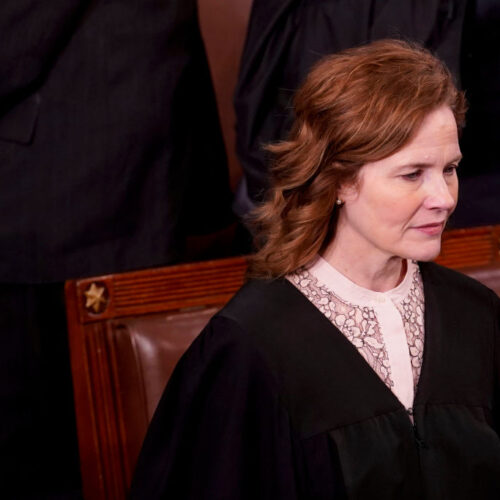After “chaotic” start, judge finds DOGE staff are now being vetted properly.
An aide sets up a poster depicting the logo for the Congressional DOGE Caucus before a news conference on Capitol Hill on February 25, 2025 in Washington, DC. Credit: Getty Images | Andrew Harnik
A federal judge has given Department of Government Efficiency (DOGE) employees access to US Treasury payment systems as long as they meet training and vetting requirements but denied the Trump administration’s motion to completely dissolve a preliminary injunction.
US District Judge Jeannette Vargas of the Southern District of New York is overseeing a case filed against President Trump by 19 states led by New York. In February, Vargas issued a preliminary injunction prohibiting the Treasury Department from granting DOGE access to systems containing personally identifiable information or confidential financial information.
In April, Vargas allowed DOGE employee Ryan Wunderly to access the Treasury Department’s Bureau of Fiscal Services (BFS) system, after government declarations said “that Wunderly has undergone the same vetting and security clearance process that applies to any other Treasury Department employee provided with access to BFS payment systems.” In an order yesterday, Vargas ruled that four more employees can access the system.
“The issue before the Court is a narrow one. The parties are in agreement that, in light of this Court’s PI [Preliminary Injunction] Modification Order, the New DOGE Employees should be permitted to have access to BFS payment systems on the same terms as Wunderly,” Vargas wrote. “Treasury DOGE Team” employees Thomas Krause, Linda Whitridge, Samuel Corcos, and Todd Newnam have satisfied the conditions for accessing the system, she wrote.
Court won’t vet new hires
Additionally, the Trump administration can add more DOGE team members without the court’s prior approval. Saying that “there is little utility in having this Court function as Treasury’s de facto human resources officer each time a new team member is onboarded,” Varagas said the injunction’s restrictions won’t apply to staff who have met the requirements.
The staff must undergo the required training and be “subject to the same vetting requirements as applied to other Treasury employees provided access to such data systems.” They must also be “employees of the Treasury Department hired in accordance with governing statutes and regulations” and be supervised and directly report to Treasury Department officials, the order said.
The preliminary injunction will stay in effect subject to those modifications. “Should the preliminary injunction remain in place unaltered, the Government would be required to obtain judicial approval each time there is turnover in the ranks of the DOGE Team,” Vargas wrote. “Should it be vacated in its entirety, Plaintiffs fear a resumption of the arbitrary and capricious conduct that the Court found likely violated the APA [Administrative Procedure Act]. Neither outcome is optimal.”
Vargas’ order in February said the states suing Trump are likely to “prevail on their claim that the challenged agency action was arbitrary and capricious.” She found that career staff “did their best to develop what mitigation strategies they could” in response to demands that DOGE be given access but that “the inexplicable urgency and time constraints under which they operated all but ensured that the launch of the Treasury DOGE Team was chaotic and haphazard.”
A rocky start
DOGE staffer Marko Elez, who resigned after being linked to a social media account that posted racist messages, was given full access without any real training, Vargas wrote in February. This happened shortly after a longtime Treasury Department official resigned after clashing with DOGE over its requests for access.
As Vargas wrote in February:
The Treasury DOGE Team started its work almost immediately [after Trump’s executive order], even though it did not yet have either the HR specialist or the attorney that the E.O. mandated should be members of the team. This left career staff with almost no time to develop their mitigation measures. Within days of his appointment, and apparently after receiving minimal, if any, training regarding the handling of sensitive government information (beyond being instructed to maintain the information on his BFS laptop), Elez was given full access to system source codes. Perhaps most troubling is that Elez was mistakenly given read/write access to SPS [Secure Payment System]. Although this error was discovered the day Elez resigned, it speaks to the hurried nature of this process that it occurred at all.
While states appear likely to succeed on the “arbitrary and capricious” claim, Vargas said most of the states’ claims are likely to fail. For example, “claims based upon the Privacy Act are unlikely to succeed on the merits” because “the States’ interest in the protection of its own financial data is not the type of interest the Privacy Act was enacted to protect,” Vargas wrote.
Privacy claims could succeed in other cases against the government. In one case filed by unions, a federal judge in Maryland determined that the Department of Education and Office of Personnel Management (OPM) likely violated the Privacy Act by disclosing personal information to DOGE affiliates without people’s consent. Another case filed by unions against OPM is pending in New York, with a hearing on a motion for a preliminary injunction scheduled for tomorrow.
Jon is a Senior IT Reporter for Ars Technica. He covers the telecom industry, Federal Communications Commission rulemakings, broadband consumer affairs, court cases, and government regulation of the tech industry.





